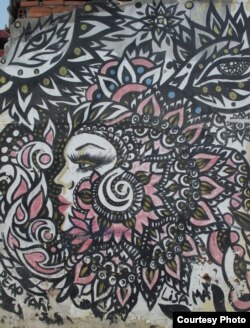Living near Boeung Kak Lake, Meach Manila spent her life surrounded by artwork and graffiti. Every day she takes a walk through the neighborhood to take in the different styles of street art on display to unwind and let the stresses of daily life fade away.
“I love graffiti. Graffiti is new and eye-catching for people,” she says. “I keep looking at the graffiti. I want it to be on everyone’s houses.”
Manlia practices what she preaches – her house is covered in graffiti art. In defiance of anti-graffiti rules that are often strictly enforced, young budding street artists in Cambodia are grabbing the headlines.
In December City Hall erased a huge mural on the side of the capital’s famous White Building and a large amount off street art at Pannasastra University.
Some artists have complained of being rejected when they have applied for permission to paint, without which their work will likely also be erased.
Chifumi, 29, the curator of the Cambodia Urban Art Festival, told VOA Khmer that the event had previously been granted permission for their festival, but the authorities had this year rejected their application.
“We didn’t get permission this year. I think perhaps City Hall is afraid after the White Building story,” he said.
Despite its often negative public image, many villagers living near popular painting spots, such as Village 6 in Daun Penh district, see the beauty and skill involved and believe the practice could boost tourism and the local economy.
Saron, Village 6 deputy chief, said since youngsters began scrawling on the walls economic activity had increased as more and more people visited the area.
“They are both foreigners and Cambodians coming to look at the graffiti every week. They want the village to attract a bigger audience,” he said. “When they come, the people’s livelihoods get better because [visitors] use motorbikes or tuk tuks to drive back.”
“The shops are running well since more tourists started coming. They buy water and other drinks. I want my local economy to continue to grow.”
Several City Hall officials declined to comment. Mean Chanyada, deputy director of the city’s administration office, said that graffiti “made the walls look messy,” adding “don’t draw on the walls.”
Ou Daniel, a 20-year-old graffiti artist, told VOA Khmer that the government did not want to pick and choose which pieces of art would be painted over and which could remain in place.
“They don’t want controversy so they just say no to everything,” he said.
Days after the now iconic mural was removed from the White Building, a strong backlash followed.
Lisa Mam, a Cambodian street artist who has travelled to France and other countries to immerse herself in different graffiti cultures, said Europeans “like it when a Cambodia-born artist fuses their own culture into that form of art.”
“I think to a foreign audience, it makes more sense when Khmer art is painted by a Khmer artist because it’s relevant.”
Manila knows the importance of gaining the proper permissions from the local authorities, and knowing what kind of art will be placed on a particular wall.
“I need to ask the artists firstly what kind of painting they will do. Whether they will draw some natural things … but if they draw something sexual or create a bad influence, I won’t let them draw on my house,” she said.
“If they draw something good, I want them to draw everywhere.”













